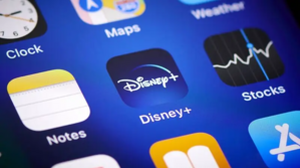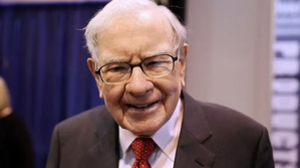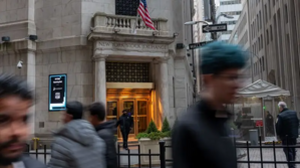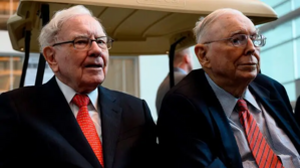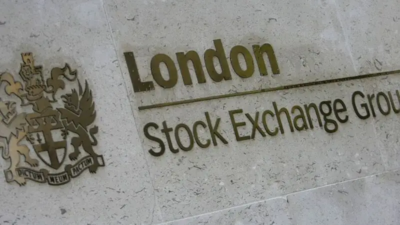Why over-optimistic investors may want to pump the brakes
A version of this story first appeared in CNN Business’ Before the Bell newsletter. Not a subscriber? You can sign up right here. You can listen to an audio version of the newsletter by clicking the same link.
The glass is half full on Wall Street. But should it be?
There’s plenty for investors to celebrate right now, but a look under the hood reveals quite a bit of decay.
Here at Before the Bell we’re playing the role of Debbie Downer to Wall Street’s Pollyanna and breaking down some of the arguments for a continued market rally.
Markets are hot: There’s been an optimistic narrative in markets these past few weeks. The S&P 500 just hit a new high for the first time in two years and the Dow crossed the 38,000 level on Monday for the first time ever. In Europe, Germany’s DAX traded at an all-time high Wednesday, and the STOXX index is closing in on a new record.
Real bond yields (that’s the return on US Treasuries minus inflation) are near six-month lows. And financial conditions are easing as borrowing costs decline, which may help economic growth.
But Wall Street’s gains are narrow: Major indexes are up, but the broad market isn’t.
As of last week, Nvidia and Microsoft accounted for about 75% of the S&P 500’s gain this year, according to analysts at Bespoke Investment Group. The 20 largest stocks in the index, they found, made up 110% of the index’s gains, while the remaining 480 were acting as a drag.
Last year, the S&P 500 rose by just over 24%, but if you were to weigh each stock in the index equally, it gained just 11.6%. That’s the largest outperformance by the S&P 500 over its equal-weighted version since the 1998 dot-com bubble, said Henry Allen, a strategist at Deutsche Bank, in a note to clients on Tuesday.
A narrow rally doesn’t necessarily mean a crash is coming. But it’s largely Big Tech that’s driving markets higher, and that concentration of gains in so few stocks carries inherent risk. “Those equity gains could prove vulnerable to a change in sentiment towards that group,” wrote Allen.
The economy is strong: Economic data has been doggedly resilient over the past few months.
The US unemployment rate is at 3.7% — the Federal Reserve predicted about a year ago that it would be at 4.6% right now. Consumer sentiment in January reached its highest level since July 2021, according to the University of Michigan’s consumer sentiment index, and retail sales were up 0.6% in December.
Economists polled by the National Association of Business Economics now overwhelmingly say that the US economy will avoid a recession this year.
On top of that, inflation rates have been broadly easing, and Americans expect that to continue. The University of Michigan found that consumers expect inflation to fall to 2.9% by next year, the lowest since December 2020.
But investors are adjusting expectations: Investors eventually get used to strong data, and come to expect it. Any signal of a weakening economy could send stocks plunging.
“It’s hard for data to keep surprising in the same direction, since investors simply adjust their expectations,” said Allen.
Rate cuts are likely: Fed officials are expecting and openly discussing interest rate cuts this year.
Fed Governor Christopher Waller said just last week that “as long as inflation doesn’t rebound and stay elevated, I believe the [Fed] will be able to lower the target range for the federal funds rate this year.”
Financial markets currently see a nearly 46% chance the Fed will cut rates by March and about an 85% chance that the Fed will cut rates by May, according to the CME FedWatch Tool.
But Wall Street could be getting ahead of itself: Since the start of the year, investors have pushed back their rate cut timelines, said Allen. Just one month ago, more than 75% of investors thought the central bank would cut rates at their March meeting.
That’s partially because a strong economy and geopolitical strife could speed up inflation, which could force the Fed to perform an about-face soon after starting to cut rates.
AI might save us: The boom in artificial intelligence has been a main driver of the recent rally in equities. And the budding industry could increase productivity in the years to come.
“In the next few years, the main impact of AI on work will be to help people do their jobs more efficiently. That will be true whether they work in a factory or in an office,” Microsoft founder Bill Gates wrote in a blog post last year.
“AI has huge potential to increase productivity,” BlackRock CEO Larry Fink said at his firm’s last investor day. “It may be the technology that can bring down inflation.”
But it could kill jobs: But the tech sector kicked off the new year with a spate of fresh job cuts that are coming at the same time as the industry is doubling down on Investments into artificial intelligence.
The continued labor upheaval unfolding in the very industry creating AI may be an omen as the technology reshapes the broader business landscape in the years ahead.
‘The straw that broke the camel’s back’: United CEO’s frustration with Boeing
United Airlines, one of the biggest buyers of Boeing jets, is losing patience with the troubled aircraft maker over its repeated quality problems, reports my colleague Chris Isidore.
“I’m disappointed that… this keeps happening at Boeing. This isn’t new,” said Scott Kirby, CEO of United, in an interview Tuesday on CNBC. “We need Boeing to succeed. But they’ve been having these consistent manufacturing challenges. They need to take action here.”
Kirby made his comments after the airline warned investors that it will report a larger-than-expected loss in the first three months of this year because of the grounding of all 737 Max 9 jets after a door plug blew off on an Alaska Airlines flight on January 5, leaving a massive hole in the side of the plane.
The plane landed without any serious injuries, but the Federal Aviation Administration ordered the grounding and additional inspections of more than 200 jets of that model worldwide.
United Airlines said it now expects its fleet of Boeing Max 9 jets to remain grounded through the end of this month, and that the company will report a first-quarter loss in the range of $116 million to $262 million. That’s more than the $138 million loss already forecast by analysts surveyed by Refinitiv.
Beyond the current 737 Max 9 problem is what this means for Boeing’s orders for the 737 Max 10, a newer, larger and more expensive version of the 737 Max that has yet to be certified by the FAA. It will be at least five years in a best case scenario before Boeing can deliver those Max 10 jets to United, Kirby said, and the airline is now no longer counting on getting that plane in the future.
“I think the Max 9 grounding is probably the straw that broke the camel’s back for us,” said Kirby. “We’re going to build a plan that doesn’t have the Max 10 in it.”
Shares of Boeing sank 1.6% on Tuesday. Shares of United gained 5.3%.
Netflix gains more than 13 million subscribers in the fourth quarter
Netflix announced a major boost in sign-ups in the fourth quarter on Tuesday. The company added more than 13 million subscribers for the quarter, compared to Wall Street’s expectation of 8.7 million, reports my colleague Samantha Delouya.
Netflix’s stock jumped nearly 10% in pre-market trading Wednesday.
In the past year, the company implemented a number of initiatives aimed at adding subscribers, including a password-sharing crackdown that pushed password “borrowers” into creating their own subscriptions and the introduction of a lower-priced advertising-supported subscription tier for $6.99.
Earlier this month, Amy Reinhard, Netflix’s president of advertising, said Netflix’s ad tier hit more than 23 million monthly memberships.
In a letter to shareholders Tuesday, Netflix declared its password sharing crackdown a success.
“We believe we’ve successfully addressed account sharing, ensuring that when people enjoy Netflix they pay for the service too,” it said.
Looking ahead to 2024, Netflix said it sees “big opportunities” to further improve its core TV and film content, while also broadening its offering into gaming, live entertainment and sports programming.
Maybe You Like
London Stock Exchange urged to do more to hold onto retail traders
The UK stock market needs to improve investor communication and engagement in order to retain its individual traders, according to a report from online trade and investor provider CMC Markets. ADVERTISEMENTUK retail investors are increasingly...
Hargreaves Lansdown rejects private equity takeover bid
The UK investment platform says the offer from a group including the Abu Dhabi Investment Authority undervalues the firm. ADVERTISEMENTHargreaves Lansdown has rebuffed a takeover proposal worth £4.67 billion (€5.48 billion) made...
Ferrovial set to offload UK regional airports amid Heathrow deal uncertainty
Ferrovial is planning to sell its stake in three UK regional airports amid difficulties in finalising its £2.4bn sale of a 25% stake in Heathrow. ADVERTISEMENTSpanish infrastructure company Ferrovial is reportedly putting up for sale...



